Before the programme, we were involved in a QMS benchmarking project called Focus on Figures.
It was a group of livestock farmers and we learned a lot through sharing farm business data.
This opened our eyes to the possibilities and so when we heard about the Farm Profit Programme and with Scott coming home from agricultural college, we felt it was worth applying.
We went head first into the programme and have been up for improving the whole farm.
However, to be honest the initial plans were pretty daunting for us. One thing that sticks in my mind from the early stages of the programme was when Declan Marren proposed we carry 10 ewes to the acre. At the time we were carrying six ewes to the acre. After Declan witnessed snow and hail in early May, we weren’t so sure we would carry 10 to the acre.
While we are not that far, we are now close to it with between 8.5 and nine ewes per acre. This is one of the things that we like about the project – there has been learning on both sides, us and the advisers.
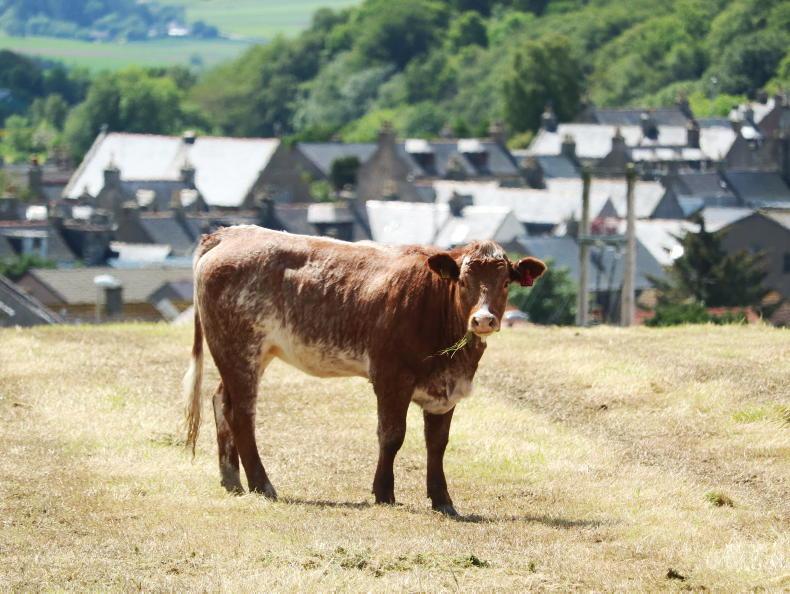
The programme has covered wet years as well as dry ones like this here in spring 2018.
Proposals from Declan Marren and Robert Gilchrist were never dictated to us and we always could feed into the proposals but they did have tactics. One of them would sow the seed and announce the changes for the farm which often looked a real challenge. Then the other one would encourage and work on us to see how it was possible. They worked really well together. In the end we didn’t turn down any of the changes which Delcan or Robert suggested.
Paddock success
Some of the changes were planned from the start like setting up paddock grazing. This was a bit of an expense in materials but turned out to be not much hassle. Measuring the fields with the GPS on the tractor made it easy and now we are set up I wouldn’t go back to how we used to graze sheep. It has really allowed us to carry so much more stock.
Other changes were made when the situation demanded them. In the dry summer of 2018, grass was getting short and we could see that we were going to be tight for silage for winter. Declan and Robert suggested planting a forage crop to outwinter the cows before coming inside to calve.
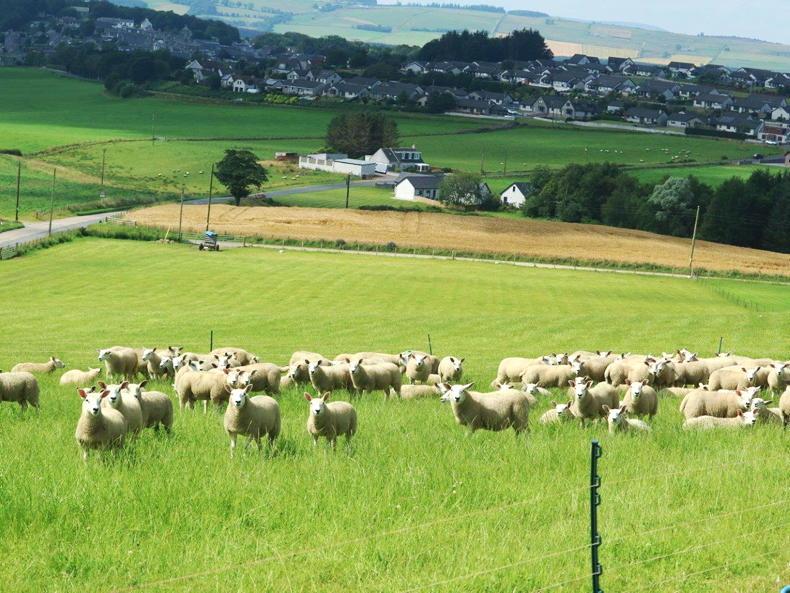
Setting up paddocks has helped the Duguids increase their stocking rate on the farm.
This was the change that surprised me the most. We direct-drilled it into what little moisture was there and the crop just shot out of the ground and then did not stop growing. The whole thing impressed me from coming through the ground right up to when it was eaten in winter. We had never previously attempted outwintering for fear of the mess it would make of the grass and had it not been for the shortage of the silage we would not have tried it. This is now a cornerstone of the spring-calving system and means we winter the cows for 91p/day. It is one of the best things we did in the programme.
Improved record keeping
and decisions
Being involved in the programme has also made us keep more accurate records, particularly with the cattle. Again, this is something we were not thinking about before the programme but what an eye opener it has been.
We now have a much better understanding of which cows are performing for us.
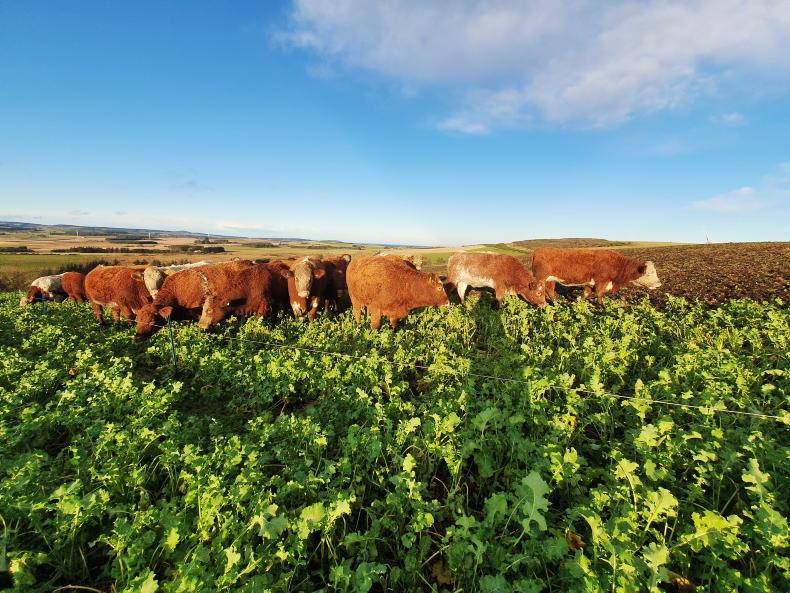
Fodder crops have helped reduce the cost of winter. Cows out-wintered on rape hybrid swift was costing 91p/cow/day.
But you need to look at this over a number of years before making breeding decisions as we had one cow which was worst performing by calf weight in the first year who then became consistently in the top few cows on the farm in the years after. She had a freak low-performing calf one year which is probably nothing to do with her.
The extra data did arm Declan and Robert with more information to push us to cull underperforming cows. This was one of the scariest changes made on the farm. One night my wife Muriel said to me “you know we are only calving 120 cows this year” this was back from the 160 cows we had when we started the project. But through bringing the best of the heifers and buying in good cattle we have the numbers back up to 160 and a better performing herd overall.
75kg/hectare less fertiliser
The project really changed our mindset on producing more grass on the farm. The advisers encouraged us to get fertiliser out on the grazing earlier in the year. Traditionally, we would go out at the end of April into May once the grass was growing vigorously. We have also reduced the amount going on through the season, when we used to put on 250kg/ha each time we went out, we now put on 185kg/ha and have seen no reduction in grass growth.
But without the advisers’ encouragement we would never have tried it. We are now producing 44% more kg of animals for no increase in fertiliser use.
Many of the changes we made were altering the system to fit the resources available and the growing season. We stopped growing spring barley and moved to all winter barley to free up time in the spring. We also pushed spring calving back to better match the cows’ energy demand with the grass supply.
I was concerned that pushing calving back would mean we would wean smaller calves but the opposite was true, they were heavier.
Learning from other farms
The programme was not just about making changes on the farm. There was also a lot of socialising and meetings which were informative and really entertaining. We have also held meetings through the programme and hosted visits from discussion groups and an NFU branch meeting. It is important to meet other farmers to share issues and it is always good to get another perspective on your business.
We got to know the other families in the programme and have made good friends with them. Without the programme we would never have come to know these farmers who are operating on very different farms and situations. Their experiences have also benefited our business helping us to look at things from a different angle.
I remember going up to visit Mark and Shona MacKay’s farm in Caithness. It was great seeing such a different farm and meeting other local farmers at the meeting. And this isn’t to mention the entertainment and fun. Last year, we even ventured to Ireland for Declan’s wedding which was a brilliant experience.
I would recommend the programme to other farming families. There was not a change on the farm that failed, and we embraced everything that Declan and Robert suggested. The family and the farm are in a much better place thanks to taking part in the programme.
Before the programme, we were involved in a QMS benchmarking project called Focus on Figures.
It was a group of livestock farmers and we learned a lot through sharing farm business data.
This opened our eyes to the possibilities and so when we heard about the Farm Profit Programme and with Scott coming home from agricultural college, we felt it was worth applying.
We went head first into the programme and have been up for improving the whole farm.
However, to be honest the initial plans were pretty daunting for us. One thing that sticks in my mind from the early stages of the programme was when Declan Marren proposed we carry 10 ewes to the acre. At the time we were carrying six ewes to the acre. After Declan witnessed snow and hail in early May, we weren’t so sure we would carry 10 to the acre.
While we are not that far, we are now close to it with between 8.5 and nine ewes per acre. This is one of the things that we like about the project – there has been learning on both sides, us and the advisers.

The programme has covered wet years as well as dry ones like this here in spring 2018.
Proposals from Declan Marren and Robert Gilchrist were never dictated to us and we always could feed into the proposals but they did have tactics. One of them would sow the seed and announce the changes for the farm which often looked a real challenge. Then the other one would encourage and work on us to see how it was possible. They worked really well together. In the end we didn’t turn down any of the changes which Delcan or Robert suggested.
Paddock success
Some of the changes were planned from the start like setting up paddock grazing. This was a bit of an expense in materials but turned out to be not much hassle. Measuring the fields with the GPS on the tractor made it easy and now we are set up I wouldn’t go back to how we used to graze sheep. It has really allowed us to carry so much more stock.
Other changes were made when the situation demanded them. In the dry summer of 2018, grass was getting short and we could see that we were going to be tight for silage for winter. Declan and Robert suggested planting a forage crop to outwinter the cows before coming inside to calve.

Setting up paddocks has helped the Duguids increase their stocking rate on the farm.
This was the change that surprised me the most. We direct-drilled it into what little moisture was there and the crop just shot out of the ground and then did not stop growing. The whole thing impressed me from coming through the ground right up to when it was eaten in winter. We had never previously attempted outwintering for fear of the mess it would make of the grass and had it not been for the shortage of the silage we would not have tried it. This is now a cornerstone of the spring-calving system and means we winter the cows for 91p/day. It is one of the best things we did in the programme.
Improved record keeping
and decisions
Being involved in the programme has also made us keep more accurate records, particularly with the cattle. Again, this is something we were not thinking about before the programme but what an eye opener it has been.
We now have a much better understanding of which cows are performing for us.

Fodder crops have helped reduce the cost of winter. Cows out-wintered on rape hybrid swift was costing 91p/cow/day.
But you need to look at this over a number of years before making breeding decisions as we had one cow which was worst performing by calf weight in the first year who then became consistently in the top few cows on the farm in the years after. She had a freak low-performing calf one year which is probably nothing to do with her.
The extra data did arm Declan and Robert with more information to push us to cull underperforming cows. This was one of the scariest changes made on the farm. One night my wife Muriel said to me “you know we are only calving 120 cows this year” this was back from the 160 cows we had when we started the project. But through bringing the best of the heifers and buying in good cattle we have the numbers back up to 160 and a better performing herd overall.
75kg/hectare less fertiliser
The project really changed our mindset on producing more grass on the farm. The advisers encouraged us to get fertiliser out on the grazing earlier in the year. Traditionally, we would go out at the end of April into May once the grass was growing vigorously. We have also reduced the amount going on through the season, when we used to put on 250kg/ha each time we went out, we now put on 185kg/ha and have seen no reduction in grass growth.
But without the advisers’ encouragement we would never have tried it. We are now producing 44% more kg of animals for no increase in fertiliser use.
Many of the changes we made were altering the system to fit the resources available and the growing season. We stopped growing spring barley and moved to all winter barley to free up time in the spring. We also pushed spring calving back to better match the cows’ energy demand with the grass supply.
I was concerned that pushing calving back would mean we would wean smaller calves but the opposite was true, they were heavier.
Learning from other farms
The programme was not just about making changes on the farm. There was also a lot of socialising and meetings which were informative and really entertaining. We have also held meetings through the programme and hosted visits from discussion groups and an NFU branch meeting. It is important to meet other farmers to share issues and it is always good to get another perspective on your business.
We got to know the other families in the programme and have made good friends with them. Without the programme we would never have come to know these farmers who are operating on very different farms and situations. Their experiences have also benefited our business helping us to look at things from a different angle.
I remember going up to visit Mark and Shona MacKay’s farm in Caithness. It was great seeing such a different farm and meeting other local farmers at the meeting. And this isn’t to mention the entertainment and fun. Last year, we even ventured to Ireland for Declan’s wedding which was a brilliant experience.
I would recommend the programme to other farming families. There was not a change on the farm that failed, and we embraced everything that Declan and Robert suggested. The family and the farm are in a much better place thanks to taking part in the programme.






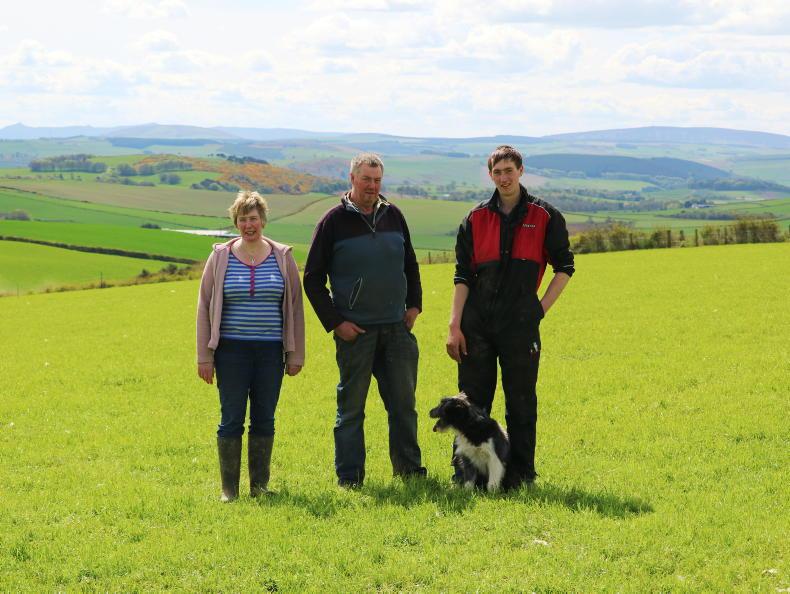
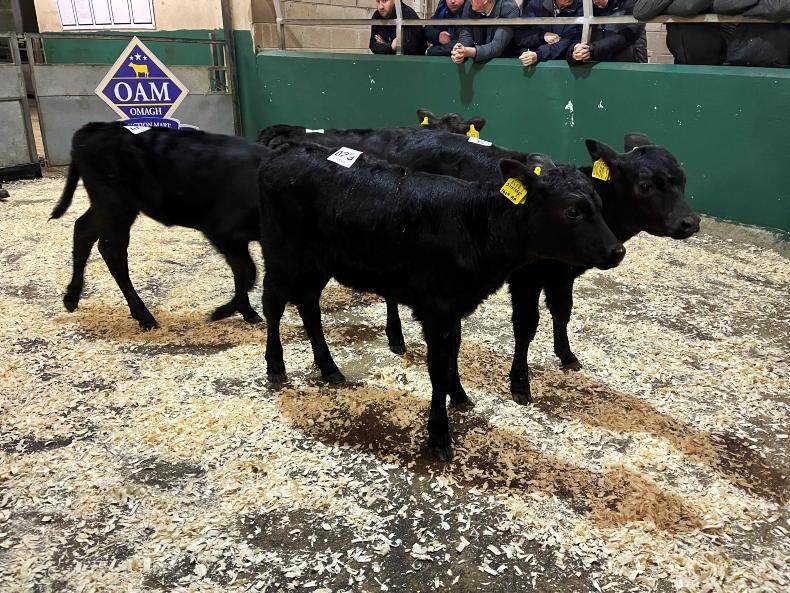

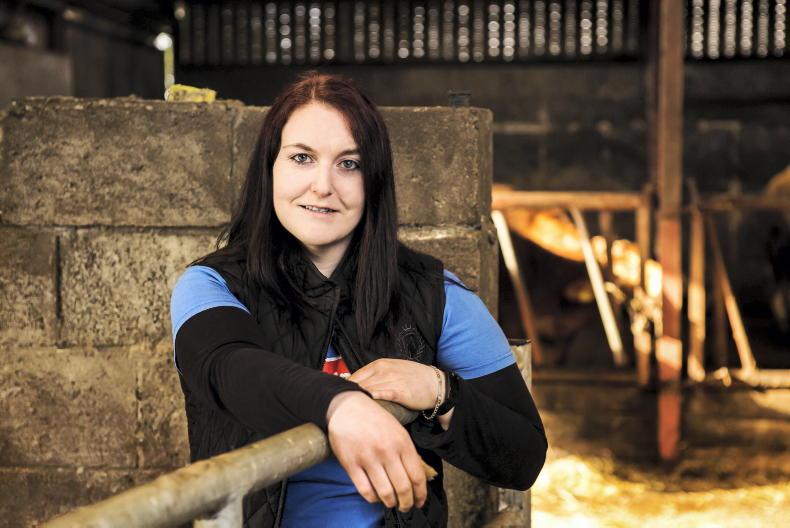
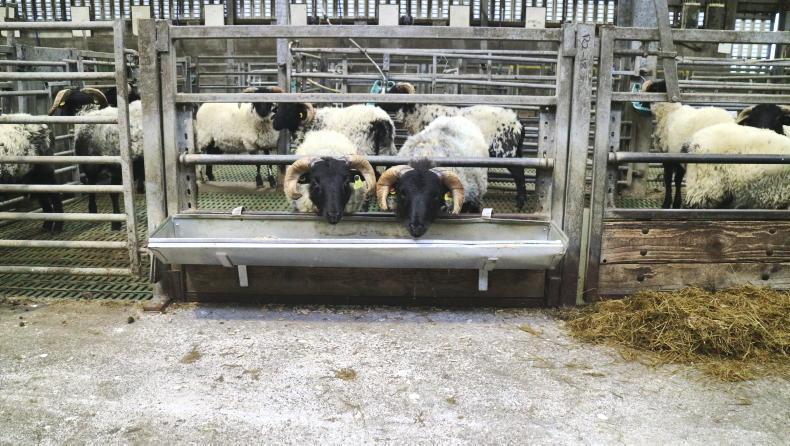
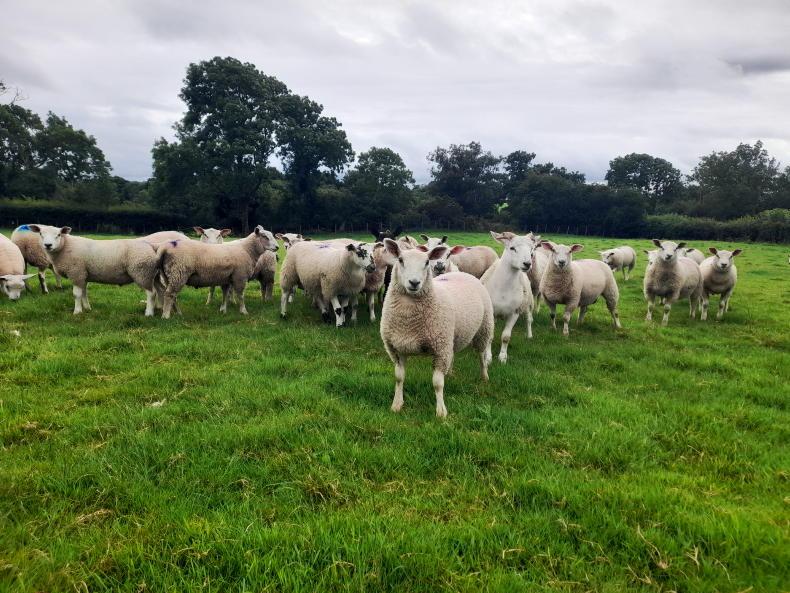
SHARING OPTIONS